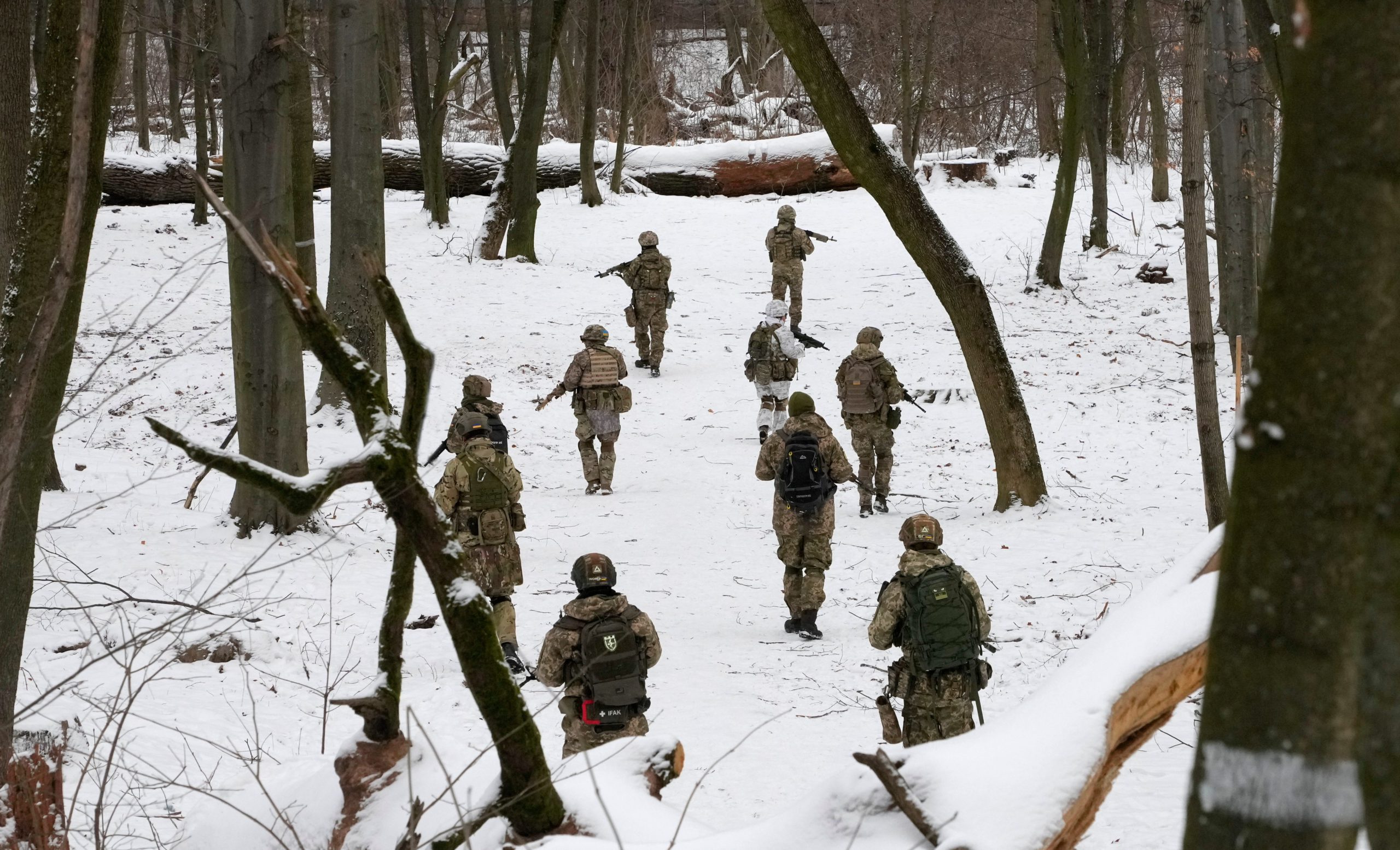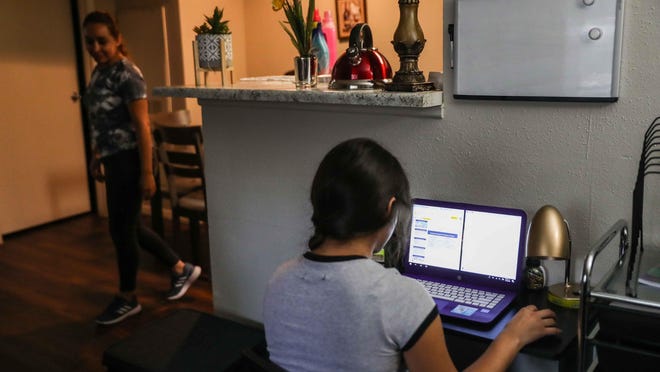

- The White House is holding classified briefings Tuesday on Capitol Hill on Ukraine.
- Ukrainian President Volodymyr Zelenskyy has urged calm.
- NATO countries are sending military assets and troops to areas closer to Ukraine.
WASHINGTON — The threat of a Russian invasion of Ukraine has prompted Western leaders to rally military assets in preparation for a potential confrontation, even as diplomats press for a peaceful resolution to the crisis.
On Monday, the Pentagon announced it is placing 8,500 troops on "heightened alert" should the United States decide to station more forces in its eastern European NATO allies.
In response, Kremlin spokesperson Dmitry Peskov said Tuesday that Moscow had "profound concern" over NATO's military movements in eastern Europe, accusing the West of “building up tension” in the region.
The Kremlin also announced military exercises on Ukraine's border, including fighter jet and ballistic missile exercises.
Peskov said diplomatic talks with the U.S. and NATO "were completed" and that any further negotiations depended on Washington's written response to Moscow's demands, which include a pledge to never allow Ukraine to join NATO and a complete withdrawal of U.S. military assets from its European allies.
More:What are Joe Biden's options with Russia in Ukraine? That all depends on Putin's next move.
Here's what we know about the crisis in Ukraine on Tuesday:
White House briefs congressional leadership and committee staff
The White House dispatched aides to Capitol Hill on Tuesday to hold two classified briefings on the crisis in Ukraine for bipartisan House and Senate leadership and committee staff, according to White House press secretary Jen Psaki.
Administration officials from the State and Defense departments are providing updates on recent developments with Ukraine and Russia and state of play, she said.
The White House is also working to hold an all-members briefing for the House and Senate "in the coming days."
The briefings are part of ongoing White House outreach to Congress amid growing fears of an imminent Russian invasion of neighboring Ukraine. Secretary of State Antony Blinken and Deputy Secretary Wendy Sherman have spoken to nearly 20 members in the last week, according to Psaki, with additional engagements planned this week.
The briefings come as House Foreign Affairs Committee Chairman Gregory Meeks, D-N.Y., announced he is leading a bipartisan congressional delegation to Belgium and Ukraine on Tuesday. The group is slated to meet with representatives from NATO and the European Union to discuss the security situation in the eastern flank countries before traveling to Kyiv to meet with senior Ukrainian officials.
– Courtney Subramanian
Ukraine weathers Russian harassment
In Kyiv, Ukrainian leaders are pressing for citizens to remain calm and resolute while stressing they don't believe a Russian invasion isn't imminent. Ukrainians have been living under the specter of Russian interference in their country — including the threat of a military invasion — since the country's independence from the Soviet Union in 1991.
On Monday, Ukrainian President Volodymyr Zelenskyy said the situation was “under control" and that an invasion from Russia was not imminent.
On Tuesday, Ukraine's security service said it had arrested Russian-aligned agents who were planning a “series of armed attacks," the agency said. The statement from the government continues that the group's actions were “coordinated by Russian special services."
Over the weekend, Ukrainian government websites were targeted by a hacker group connected to Belarusian intelligence services. Ukrainian and U.S. officials say it is likely Russia orchestrated the attack.
Ukrainian forces continue to fight Russian-backed separatist groups in the Donbas, a region in eastern Ukraine. Russia has also occupied Crimea, a region in southern Ukraine, since 2014.
Russian forces are also stationed in Belarus, to Ukraine's north while over 100,000 Russian troops along with battle-ready aircraft are stationed across Ukraine's border.
Boris Johnson calls for protecting 'Europe whole and free'
NATO countries, including Denmark, France, the Netherlands and France, have also announced intentions to deploy military assets or troops to the military alliance's eastern flank.
The United Kingdom has sent high-tech weapons, including antitank defense systems, to Ukraine in recent days. It has accused the Russian government of planning regime change in Ukraine and released the names of prominent Ukrainian politicians who the Kremlin sees as candidates to lead a puppet government.
“We cannot bargain away the vision of a Europe whole and free that emerged in those amazing years from 1989 to 1991,” U.K. Prime Minister Boris Johnson said in a speech to Parliament on Tuesday, referencing the fall of the Soviet Union.
Last week, the Baltic countries, which are also NATO members, also announced they'd send anti-tank weaponry to Ukraine directly, a decision endorsed by the Biden administration. the United Kingdom
Canada joins US, UK in sending families home
The U.S., U.K., and Canada have each ordered the families of diplomats based in Ukraine to evacuate the country. The U.S. has also issued a warning to all Americans in Ukraine to leave the country.
"Now is the time to leave," White House press secretary Jen Psaki said in a Monday briefing. The decision was called premature by European leaders, with Oleg Nikolenko, a spokesperson for the Ukrainian Foreign Ministry, writing the move is “a premature one & an instance of excessive caution,” on Twitter.
Diplomatic efforts continue
As both NATO and Russia marshal for a serious conflict, Biden administration officials continue diplomacy with Moscow to find a peaceful resolution while coordinating with allies should the worst become inevitable.
On Monday evening, Biden met with a number of European leaders and NATO Secretary General Jens Stoltenberg to discuss the situation in Ukraine and how to coordinate a united response to a potential invasion or other interference.
Other participants included European Commission President Ursula von der Leyen; French President Emmanuel Macron; German Chancellor Olaf Scholz; Italian Prime Minister Mario Draghi; Johnson, the U.K. prime minister; Polish President Andrzej Duda.
Last Friday, Secretary of State Antony Blinken met with his Russian counterpart, Foreign Minister Sergey Lavrov, to discuss a potential solution to the crisis. Diplomacy has been in a holding pattern since, with the Kremlin saying it expects a written response to its demands “this week” before negotiations can continue.
The U.S. has said it will honor that request in writing sometime this week, a move which Psaki, the White House press secretary, called "a standard part of diplomacy" and "the basis of basically every agreement we've ever had with the Russians."
French President Emmanuel Macron is also set to speak with Putin sometime this week about potential de-escalation, according to his office. The Biden administration has not ruled out a summit between Biden and Putin but hasn't said any plans for such a meeting are on the horizon.
The Kremlin has made a series of demands that NATO halts its expansion eastward and that the U.S. pull back its forces from eastern Europe, if not the entire continent. NATO, which sees itself as a military alliance of nations choosing to join, considers any bans on its expansion to be a non-starter.
Secretary of State Antony Blinken conceded that the Kremlin may "simply going through the motions and it won't affect their ultimate decision" during a Sunday interview with NBC News' "Meet the Press."
Blinken also stressed that it is Putin's choice as to whether there is war or diplomacy in the conflict.
Follow Matthew Brown online @mrbrownsir.








